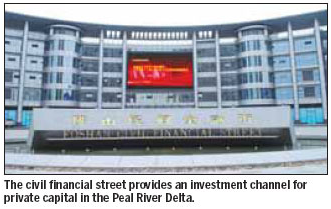Financial innovations fuel enterprises in South China
Updated: 2013-12-05 16:45
(China Daily)
|
|||||||||||
The over-the-counter market of Guangdong High-Tech Service Zone for Financial Institutions went into operation in late October.
The third of its kind in Guangdong province, the zone's OTC market targets growth enterprises, such as SMEs, mini-enterprises, innovation-driven enterprises, technology-intensive companies, publicly held firms and those under share reform in high-tech industrial zones throughout the province.
The other two OTC markets in Guangdong are located in Guangzhou and Shenzhen, respectively.
The OTC market trades in bonds in addition to serving as a stock exchange. Market participants trade via such forms of communication as telephone, email and proprietary electronic trading systems.
So far, 217 enterprises throughout the province, including those in the cities of Guangzhou, Foshan, Zhongshan, Zhaoqing, Jiangmen, Qingyuan, Shaoguan and Yangjiang, have registered at the zone's OTC market in an attempt to raise funds exceeding 3 billion yuan ($492.3 million), according to a report released recently by the zone's administrative committee.
Operation of the OTC market signals the involvement of the zone in the financial core of the capital market and marks a milestone in the financial development of the zone as well as the city of Foshan, the report said.
The zone's OTC market aims to have 300 enterprises registered by the end of this year and 500 by the end of 2014.
Also, the zone administration launched a non-governmental financial street in July, the second of its kind in the province, setting up a non-governmental financing platform for the city of Foshan and even for the whole Pearl River Delta region, the report said.
More than 50 financial and service institutions, including 14 micro-credit companies, have signed contracts to open businesses there, pooling more than 4 billion yuan social capital and raising funds of 2.2 billion yuan for SMEs and mini-enterprises, a boon for more than 3,000 enterprises and self-employed businesses, according to the report.
Operation of the non-governmental financial street helps to boost the integration of finance, science and technology and industry, analysts said.
"It helps to revitalize the colossal social capital, while enabling SMEs and mini-enterprises to gain easier access to credit, which would be otherwise harder from traditional financial channels," they said.
Official statistics indicate that Foshan had 336,000 private-sector enterprises in late 2012, making up 95 percent of the city's total registered firms, while the city posted a deposit balance of 921.68 billion yuan and residents' savings of 480.71 billion yuan.
Anyway, fewer than 30,000 SMEs or mini-enterprises can access bank credit, or less than 10 percent of the total number.
The non-governmental financial street plans to have 150 financial outlets and pool 10 billion yuan worth of social capital by 2015, the report said.
In addition to the key financing platforms, Guangdong High-Tech Service Zone for Financial Institutions has also made evident headway in major financial back-office projects and high-end front-office operations, according to the report.
It cited the projects funded by KPMG, China Pacific Insurance (Group) Co Ltd and the Swiss Kuehne & Nagel Group as successful examples of the back-office operations.
zhanlisheng@chinadaily.com.cn

Hot Topics
moon rover air defense identification zone CPC and reform China and Japan air pollution Cameron in China
Editor's Picks

|

|

|

|

|

|






